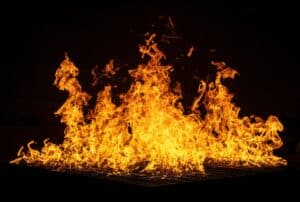
Craig Miller thought he would get away from the wildfires when he moved from California to upstate New York. Instead, at the age of 65, he found himself training to put them out.
The Guardian reports that when Craig Miller moved from California to the Catskill mountains in upstate New York in 2019, the freelance journalist wanted to get away from traffic jams and wildfires and enjoy a quieter pace of life. Yet, one year into his stay, at the age of 65, he became his town’s newest volunteer firefighter.
“It was something I realised I had to do as rural fire departments are desperate for people to help out,” he says. “Answering the pager for callouts at all hours of the day isn’t an ideal retirement, but four years in, it has become one of the most rewarding parts of my life.”
It was Miller’s eye for a story that first alerted him to the issue facing volunteer fire departments. Driving around town and noticing recruitment signs, he decided to dig further for the PBS website Next Avenue.
“Speaking to fire chiefs, I realised they are in crisis since more than 60% of all firefighters in the US are volunteers, and rural areas can’t get young people to join,” he says. “The chief was trying to recruit me as soon as I hit town and said that it didn’t matter about my age as there is a job for everyone.”
Miller was unsure about the level of commitment and training required, while his partner, Heidi, wasn’t keen on the danger it might involve. Yet, as the Covid lockdowns were enforced, Miller realised that volunteering would be a good way to become a part of the community.
He signed up to train as an external firefighter, which meant he only tackled blazes from outside the burning structures rather than potentially running inside buildings to rescue people. He was soon ready to respond to emergencies, and given a uniform, helmet and pager.
“The exterior firefighting training owned my life for three months, with night classes and Saturday sessions covering everything from operating a pump panel to throwing ladders,” he says. “We started every session with a ‘donning drill’, racing to put 40lb (18kg) of equipment on in under a minute. We sometimes had to do it four or five times and I was staggering by the end. It immediately improved my fitness.”
Passing his certification and becoming a full member of his crew, Miller witnessed the extent of the problem facing rural fire departments. “The average age of our crew is 54 and only three of us are under 45,” he says. “We have some in their 70s and I’ve seen other crews where people are in their 80s. Every person counts.”
While younger volunteers might be needed to rush into burning buildings, older members are typically external firefighters. Averaging 60 callouts a year, many of them due to faulty smoke detectors or part of mutual aid requests from neighbouring departments, Miller has experienced his fair share of hair-raising moments.
“I’ve been on car fires and wildfires, which are stubborn and difficult. Cars can also give off some gnarly fumes when they are melting,” he says. “The worst feeling is when you get paged, show up and you’re the only one at the station. That happened once when I was early into my training and it was terrifying thinking I would have to lead the callout.
Luckily, when I arrived on the scene there were other emergency medical staff there to help. ”Despite the urgent need for volunteers, Miller has learned to set boundaries and not respond to calls when he might be putting himself at risk. “You need to know when to say no. No one will call you up on it, since the pressure to show up is all self-imposed,” he says. “If it’s 90F (32C) outside and I’m running in all my gear, I’m putting myself in too much danger at my age. So it’s better to stay at home.”
Now 69, Miller has noticed a huge positive effect on his physical fitness thanks to his fire crew’s weekly drills. “Manoeuvring a fire hose that’s fully pressurised is like handling a 200ft python that doesn’t want to be moved,” he says. “It’s a workout being on the nozzle and it’s definitely kept me feeling young.”
The greatest impact has come from helping people during some of the worst moments of their lives. “It’s massively rewarding to put yourself out there for strangers and they are so grateful for us, too,” he says. “Someone accidentally started a forest fire with his chainsaw and after we put it out he sent us a very nice donation. It showed how much people appreciate us.”
Despite initially thinking he would stop volunteering at 70, as that milestone approaches, Miller is now committed to carrying on. “I feel like I’m still learning and that’s really exciting to me,” he says. “One of the essential things in life is to feel you have a purpose, and this is mine. I’ll keep going as long as I’m able. It gets in your blood.”
(Article source: The Guardian)

